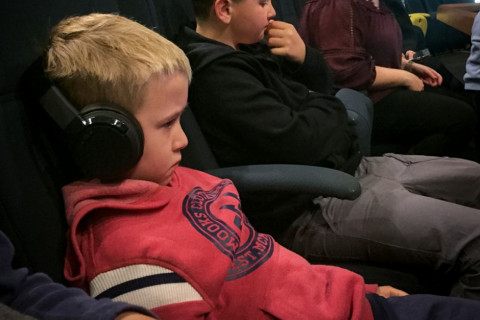
Catherine Heuzenroeder
Cinemas are turning the volume down and leaving the lights up during special 'sensory-friendly' film screenings designed for children with autism.
Kirsty Johnson has never taken her youngest son to the movies.
 Photo: Kirsty Johnson felt she was able to comfort her son at the sensory-friendly film screening without having to leave the theatre. (ABC Riverland: Catherine Heuzenroeder)
Photo: Kirsty Johnson felt she was able to comfort her son at the sensory-friendly film screening without having to leave the theatre. (ABC Riverland: Catherine Heuzenroeder)
While both of her boys are on the autism spectrum, her youngest in particular would not cope with the loud noises, the darkened theatre and all the people.
"He would just scream and we would have to leave," Ms Johnson said.
She has now ventured to the cinemas with her sons for the first time to see a special sensory-friendly film screening, during which the lights are kept up, the movie volume is turned down and audience members are free to get out of their seats and move around the theatre.
"Going to public events altogether is quite difficult," Ms Johnson said.
"The youngest especially — he's never been to the movies.
"We are pretty excited to come somewhere where it's safe and it will suit his needs a little better."
Even for the sensory-friendly screening, she came prepared.
"Anywhere we go we have to have one parent per child, so I've brought my best friend," she said.
"We've brought earmuffs, in case it is too loud.
"If I can get through even half the movie it will be exciting, the full movie would be amazing."
Sensory-friendly initiatives growing
The sensory-friendly screenings are being introduced as awareness increases of the importance of reducing the triggers that can cause sensory overload for people on the autism spectrum or with other disabilities.
Some supermarkets have introduced quiet shopping hours while many schools have replaced loud, repetitive bells with music.
Country Arts SA is trialling sensory-friendly screenings at two of its regional theatres with the aim of making the big screen experience more inclusive for people with sensory-processing disorders.
Media player: "Space" to play, "M" to mute, "left" and "right" to seek.
Video: Sensory-friendly playground helping people with autism to feel safe and calm (ABC News)
One of those regional theatres is the Chaffey Theatre at Renmark and manager Sharlene Goodman said she hoped to continue the screenings as a regular offering, especially during school holidays.
"We had a couple of parents through Facebook and also over the box-office counter asking whether we offered them," Ms Goodman said.
"I think there is more awareness now of the need for families to have this service offered to them."
She said that the screenings were designed to allow families to relax without worrying about their children disturbing other moviegoers.
"We welcome kids to get up and move around; families can sit back and just enjoy a film without having to stress about their child making noise and upsetting anyone
"These films are specifically for families that have children who can't sit still … so they can actually come out and enjoy a film rather than being at home and being excluded from enjoying public film.
"It has always been that in the cinema you have to have the 'golden silence' in there, so it can be quite stressful for a parent."
Parents feel judged by others
Gayle Hullah is another mum with children on the autism spectrum.
She said that going anywhere in public was a challenge and that in the past movies had been off-limits.
"Once the lights go down it can be really overwhelming for the children," Ms Hullah said.
"When they become stressed and anxious, they start to fidget, they make funny noises … it generally draws a lot of attention and makes it hard for her to de-escalate and calm down."
 Photo: Gayle Hullah waits in the foyer of the Chaffey Theatre for the movie to start. Her son has brought a weighted blanket and a soft toy to help him cope.
Photo: Gayle Hullah waits in the foyer of the Chaffey Theatre for the movie to start. Her son has brought a weighted blanket and a soft toy to help him cope.
Ms Hullah said she felt judged by other people when her children experienced sensory overload.
"In the supermarket, if she becomes overwhelmed she will often sit down where she is and rock or cry because she's trying to get control of her emotions," Ms Hullah said.
"People walk past, they make nasty comments, unfortunately a lot of it is ignorance or not understanding."
The sensory-friendly film screenings were an opportunity to socialise with other families that had similar experiences.
"We generally need support of one or more people to attempt an outing like this," Ms Hullah said.
"Being able to come with other families who know what is like, who have children who experience the same challenges, or are generally just more tolerant, makes it a lot easier to attempt it."
Experiences like Ms Hullah's are all too common.
Sharlene Bevington is a private social worker who welcomes changes such as special film screenings, quiet shopping hours and segregated areas at public events that make life more inclusive for people with sensory processing disorders.
"The Christmas pageant down in Adelaide does it every year, they have a sensory area where the kids can sit in a small, confined fenced area," she said.
Ms Bevington is sympathetic to the stress that parents of children with autism experience.
"For other people who don't understand what is happening it can be quite distracting," she said.
"There's a lot of judgement on parents.
"There's a lot more education to happen but it is good that this is starting to happen."